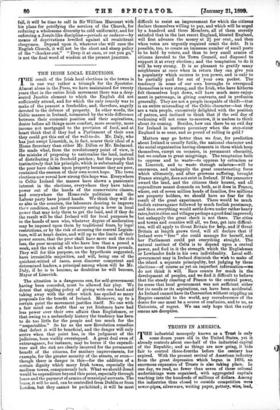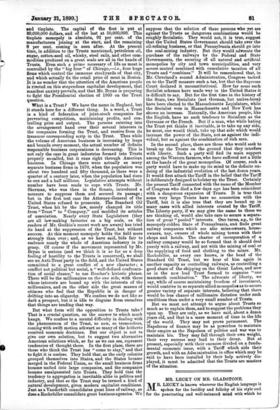TRUSTS IN AMERICA.
THE industrial monopoly known as a Trust is only some dozen years old in the United States, yet it already controls about one-half of the industrial capital of the Republic; and as things are now going, it bids fair to control three-fourths before the century has expired. With the present revival of American industry from the great depression which began in 1893, an enormous expansion of Trusts is also taking place, In one day, we read, no fewer than seven of these colossal undertakings were organised, with aggregated capitals reaching into the hundreds of millions of dollars. Among the industries thus closed to outside competition were sewer-pipes, silverware, writing paper, pottery, wire, lead, and tinplate. The capital of the first is put at 80,000,000 dollars, and of the last at 50,000,000. This tinplate monopoly is absolute, 92 per cent. of the manufacturers joining at the start, and the remaining 8 per cent. coming in soon after. At the present time, in addition to the Trusts mentioned, petroleum oil, sugar, cotton-seed oil, whisky, steel rails, and other com- modities produced on a great scale are all in the hands of Trusts. Even such a prime necessary of life as meat is controlled by the " big four" of Chicago,—i.e., four huge firms which control the immense stockyards of that city, and which actually fix the retail price of meat in Boston. It is no wonder that the attention of the American people is riveted on this stupendous capitalist development, that manifest anxiety prevails, and that Mr. Bryan is preparing to fight the Presidential election of 1900 on the Trust question.
What is a Trust ? We have the name in England, but it stands here for a different thing. In a word, a Trust is a kind of federation of joint-stock companies for preventing competition, maintaining profits, and con- trolling price and output. The persons entering into the arrangement hand over their several interests in the companies forming the Trust, and receive from its treasurer corresponding scrip in the Trust. Thus while the volume of American business is increasing by leaps and bounds every moment, the actual number of definite responsible business corporations is decreasing. This is not only the case in great industries formed into Trusts properly so-called, but it runs right through American business. In Chicago there were actually as many separate business firms in 1870, when the population was about two hundred and fifty thousand, as there were a quarter of a century later, when the population had risen to one and a half millions. Legislative attempts without number have been made to cope with Trusts. Mr. Sherman, who was then in the Senate, introduced a measure to suppress them and secured its passage ; but in the first test case the Attorney-General of the United States refused to prosecute. The Standard Oil Trust, when hit by the law, merely changed its title from " Trust " to " Company," and modified its articles of association. Nearly every State Legislature (they are all law-making factories on a big scale, as the readers of Mr. Godkin's recent work are aware) has tried its hand at the suppression of the Trust, but without success. At this moment monopoly holds the field more strongly than ever ; and, as we have said, bids fair to embrace nearly the whole of American industry in its grasp. Of course if the movement represented by Mr. Bryan is serious (and we think it is so far as a deep feeling of hostility to the Trusts is concerned), we shall see an Anti-Trust party in the field, and the United States committed to a great conflict of a new character ; a conflict not political but social, a " well-defined confronta- tion of social classes," to use Roscher's historic phrase. There will be the millionaires on the one side, with those whose interests are bound up with the interests of the millionaires, and on the other side the great masses of citizens who feel that the Republic is in danger of drifting into an oligarchy. We confess we do not like so dark a prospect, but it is idle to disguise from ourselves that things are tending that way.
But what form will the opposition to Trusts take ? That is a crucial question, on the answer to which much hangs. We confess to a mental difficulty in dealing with the phenomenon of the Trust, so new, so tremendous, coming with swift motion athwart so many of the hitherto received economic doctrines. But our object is not to give our own solution, but to suggest two alternative American solutions which, so far as we can see, represent tendencies of thought there. In the first place, there are those who think the Trust has " come to stay," and that to fight it is useless. They hold that, as the early colonies grouped themselves into States, and the States became merged in the Federal Union, so the small business firms became united into large companies, and the companies became amalgamated into Trusts. They hold that the tendency to aggregation is inevitable alike in politics and industry, and that so the Trust may be termed a kind of natural development, given modern capitalist conditions. Just as a Vanderbilt consolidates great lines of railway, so does a Rockefeller consolidate great business agencies. We suppose that the solution of these persons who yet are against the Trusts as dangerous combinations would be roughly Socialistic. They would not, it is true, suggest that the United States Government should take over the oil-refining business, or that Pennsylvania should go into the coal-mining industry. But they would advocate the purchase of the railways by the Federal and State Governments, the securing of all natural and artificial monopolies by city and town municipalities, and very severe control combined with cumulative taxation of all Trusts and "combines." It will be remembered that, in Mr. Cleveland's second Administration, Congress tacked on to the Tariff measure such a tax, but that the Supreme Court declared it unconstitutional. How far some such Socialist schemes have made way in the United States it is difficult to say. But for the first time in the history of the State, two Socialists (not German, but native-born) have been elected to the Massachusetts Legislature, while the Socialist vote in Massachusetts and New York has shown an increase. Naturally, the American people, like the English, have no such tendency to Socialism as the Germans or the French. But if a man, who while hating the Trust yet thinks it inevitable, is to take up any side, he must, one would think, take up that side which would increase the power of the State, not as against the indi- vidual, but as against the combination of rich men.
In the second place, there are those who would seek to break up the Trusts on the ground that they interfere with liberty. Such a party will find its main support among the Western farmers, who have suffered not a little at the hands of the great monopolies. Of course, such a party would have to make up its mind to the definite un- doing of the industrial evolution of the last dozen years. It would first attack the Tariff in the belief that the Tariff is deliberately designed to bolster up the Trust. Certainly the present Tariff connected with the name of the Member of Congress who died a few days ago has been coincident with a dangerous expansion of Trusts. It is true that some very large Trusts have no connection with the Tariff, but it is also true that they are bound up in many cases with allied interests created by the Tariff. The Liberty party, if we may give the name to those we are thinking of, would also take care to secure a separa- tion of great " pooled" interests. One turns, e.g., to the monopoly-ridden State of Pennsylvania, and finds great railway companies which are also mine-owners, house- owners, nay, owners of whole mining towns with their shops and hotels. The charter of incorporation of a railway company would be so formed that it should deal purely with a railway, and not with the mining of coal or the supplying of food and clothing to the miner. Mr. Rockefeller, as every one knows, is the head of the Standard Oil Trust, but we hear of him again in another capacity as controlling railways, as controlling a good share of the shipping on the Great Lakes, and now as in the new lead Trust formed to organise "one mammoth combination." The advocate of liberty, we say, while of course maintaining freedom of investment, would contrive to so separate allied monopolies as to secure greater variety of separate interests, believing that there would be less chance of millionaire dictation under such conditions than under a very small number of Trusts. But we must not attempt to argue about Trusts so much as to explain them, and to suggest the problems they open up. They are only, as we have said, about a dozen years old, and that is a mere moment of time in the life of the world. They may not prove permanent. The Napoleons of finance may be as powerless to maintain their empire as the Napoleon of politics and war was to maintain his. They may fall through their own weight, their very success may lead to their decay. But at present, especially with their enemies divided on a funda- mental economic issue, with a Tariff which aids their growth, and with an Administration in office which may be said to have been installed by their help actively dis- played, it must be admitted that the Trusts are masters of the situation.



































 Previous page
Previous page